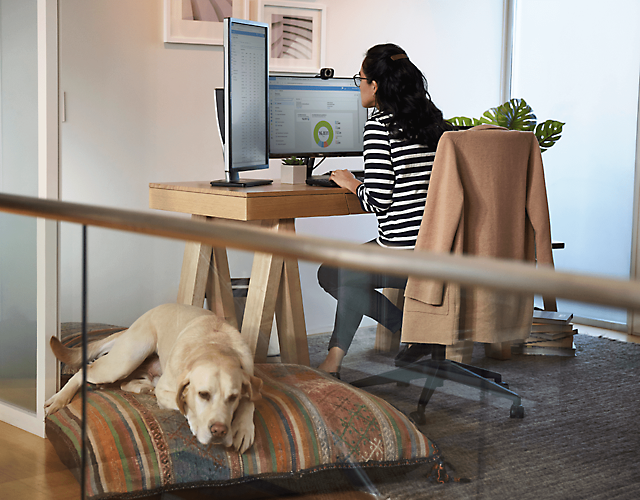What is a VPN?
A VPN, which stands for virtual private network, is a type of online service that allows you to hide your browsing activity, identity, and location while browsing the internet.
Typically, in order to access the internet, your computer creates a public connection to your internet service provider, or ISP. A VPN creates a private connection between your computer and a remote server, owned by the VPN provider. This digital connection, or tunnel, encrypts your data so that no one else can see it. It also masks your IP address so that no one else can trace you. As a result, your online experience is safer, more secure, and more anonymous.
Now that you know what a VPN is, let's explore the safety benefits of using one, as well as the kind of features you should look out for when choosing a secure VPN provider.


Are VPNs safe?
Sending your data to a third-party server may seem scary, especially if you've never done it before. How can you tell if a provider is delivering on its promises? Just how safe is a VPN?
Although it may sound like something you'd find on the dark web, VPN technology is entirely legal, safe, and accessible to anyone who might want to safeguard their data. Organizations use VPNs to add an extra layer of privacy to their network, while individual users may use one to prevent fraudsters from stealing their information, especially over a public Wi-Fi network. With the rise of identity theft and other forms of cybercrime, that extra layer isn't just a nice bonus—it's necessary for staying protected.
Choosing a safe VPN provider
State-of-the-art encryption. Security is the most integral feature of any VPN, which is why you should choose a provider that uses the latest industry-leading encryption technology. An AES 256-bit encryption, which is used by banks and state departments, is the current gold standard, and is supported by most VPN protocols. A strong encryption method ensures that your data remains illegible to anyone who doesn't have permission to read it.
Options around IP address masking. The ability to disguise or reroute your IP address is another key feature that VPNs offer. A good provider should allow you to switch your IP address to that of your provider's remote servers. The more servers around the world, the more locations—and IP addresses—you may have to choose from.
Kill switch. If your VPN connection unexpectedly drops, then your IP address could get compromised. A kill switch feature cuts off your applications, or even your internet, as soon as you're disconnected. This, in turn, protects you from data leaks and safeguards your identity.
Zero-log policy. Like your ISP, a VPN provider could potentially access, sell, or give away the data you share while you're tapped into the VPN network. That's why it's essential that you choose a company with a transparent logging policy, or zero-log policy. With a zero-log VPN, or no-log VPN, any data that gets transmitted across your secure connection doesn't get stored or collected. This may include login credentials, usage logs, your search history, or even your IP address. Not only does this policy protect your identity in the face of potential data breaches, but it also ensures that your provider isn't using or disclosing your information for monetary gain.
Secure authentication. When a computer connects to their provider's server, they must first authenticate their identity by logging in through a web portal or VPN client. A good VPN should provide additional options for authentication, such as multi-factor authentication (MFA), which authorizes your login through a mobile app, or physical security keys, which allow you to securely login only after inserting a USB stick.
A trusted reputation. Like any top software company, a good VPN provider should be known for its robust network infrastructure, strong security record, open transparency, and knowledgeable, easy-to-reach support team.
Transparent pricing. Thanks to rising awareness around online security, the VPN space has seen a significant uptick in new providers—and many of them offer their services for free. But how do these services compare to their paid counterparts? Are free VPNs safe?
A premium VPN may require a monthly fee, but the quality of service and security you'll receive is worth the price. When a service operates on a paid subscription model, your money helps pay for the cost of infrastructure, maintenance, and support. A free VPN might claim to offer the same features as a premium provider, but it might also collect and sell your data to third-party advertisers—the very thing a VPN was designed to protect against—in order to pay for those features. When researching VPNs, it's best to choose one with a transparent business model, and often, free services fall short. Avoid them, if you can.
Are VPNs secure?
Security for organizations and remote workers. Many organizations use VPNs to safeguard company data so that no one who isn't connected to their network can see it. This is essential when dealing with sensitive information, like work emails or banking information. A VPN also makes it possible for remote workers to access company resources, even when they aren't on site.
A private connection on public Wi-Fi. On an unsecured network, anyone can see your personal information. A VPN connection defends against this by encrypting your data and hiding your identity, which is especially needed for mobile browsing on public Wi-Fi.
The ability to safely sidestep content blocks and censorship. When a user connects to a VPN server, they have the ability to switch, or spoof, their location to wherever the server is based. Location spoofing is useful for bypassing firewalls, content blocks, and forms of government censorship, allowing for a restriction and surveillance-free browsing experience.
Protection against third-party tracking. Your unique IP address is used to track your browsing history, which can be sold, given away, or compromised. When you reroute your connection from your internet service provider to a remote VPN, the VPN replaces your real IP address with a dummy IP, rendering you untraceable to your internet service provider, advertisers, fraudsters, and the state.
Protection against cybercrime. IP masking and location spoofing also helps protect against identity theft, doxing, DDoS attacks, and other forms of cybercrime. If your identity remains concealed, then no one can steal it or reveal it, and no one can attack you.
Just how secure is a VPN?
A VPN may boast strong protocols and military-grade encryption, but that doesn't mean it's infallible. It can't prevent cookie tracking, viruses, or malware, and it can't protect against phishing scams. Data leaks could occur. But most pivotally, a VPN is only as secure as the company that runs it. A VPN provider that uses out-of-date protocols, leaks IPs, and logs your data isn't one you can trust. No VPN can guarantee absolute security, though choosing a reliable one—and being proactive with securing your systems—can bring a world of difference.


What is VPN protection?
The overall safety and security benefits of a VPN are clear, but with the availability of free privacy tools like private browsing and proxy servers, a VPN may seem a little excessive to the average user. Is a VPN necessary for everyday use? Do VPNs really work?
Most web browsers offer a private browsing feature, which prevents a user's browsing history from being stored on their local device with each session. This keeps your data private from other local users, but it doesn't stop that data from being accessed by third-party entities, like cybercriminals, or your ISP. That's because private browsing can't hide or disguise your IP address, which is used to track your online activity. Private browsing may provide some degree of privacy, but it doesn't establish anonymity.
Proxy servers offer a greater level of protection, and in fact, they function in the same way VPNs do. A proxy server reroutes your online activity to a remote server, which masks your IP address, hides your location, allows you to sidestep content blocks, and prevents third-party tracking. The difference between a proxy server and a VPN is security. A good VPN uses the highest levels of encryption technology to keep your data private and your connection secure, while a proxy connection only offers standard levels of security. It's also important to note that proxies only offer protection within the application it's configured for. If you have a proxy enabled on your web browser, it won't work for your desktop client.
| Hides browsing activity | Data encryption | IP masking | Level of protection | Sidestep content restrictions | Prevent third-party tracking | |
|---|---|---|---|---|---|---|
| Private browsing | | | | Browser | | |
| Proxy server | | | | Browser, app | | |
| VPN | | | | System wide | | |
What a VPN provides is strong protection of your data, identity, and autonomy across all applications—something other privacy tools just aren't equipped for. A VPN connection is made through highly secure protocols at a level of encryption that has never been cracked. This, coupled with the anonymity of IP masking and location spoofing, renders your online presence nearly untraceable. If you or your organization handle sensitive information, then a VPN is a must. But for anyone looking for a freer, safer, and more secure experience on the internet, a VPN offers the soundest peace of mind.
Frequently asked questions
-
VPNs are entirely safe, legal, and accessible—so long as you choose a reputable provider with strong encryption, IP masking, and transparency around logging and pricing.
-
It's best to go with a premium service. To pay for the costs of running a service, a free VPN provider may limit your usage, skimp on features, or even access and sell your data to third-party advertisers. Even free VPNs come at a price.
-
While a VPN can't guarantee absolute security, it's the go-to method for safeguarding your private data. It can also offer you strong protection against third-party tracking, government censorship, and cybercrime.
Get started with an Azure free account
Enjoy popular services free for 12 months, more than 55 services free always, and USD200 credit to use in your first 30 days.


